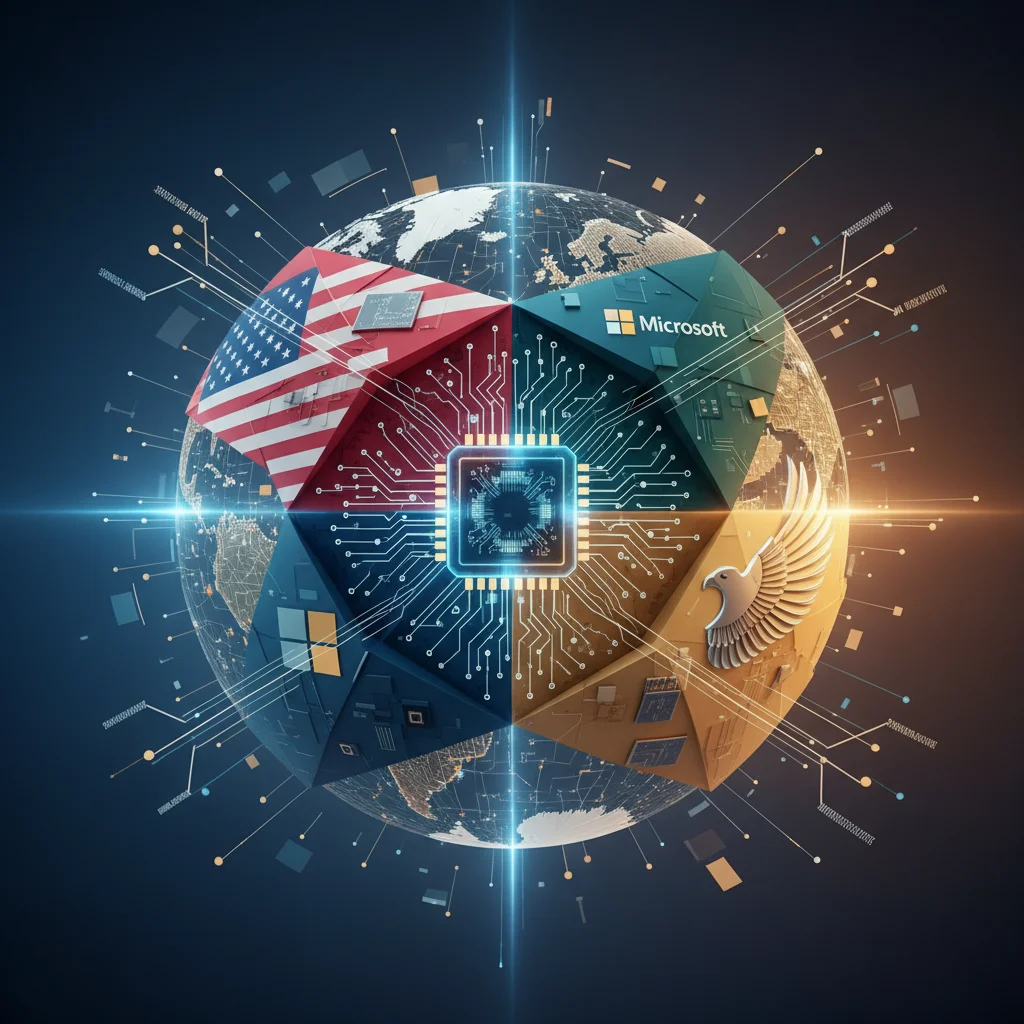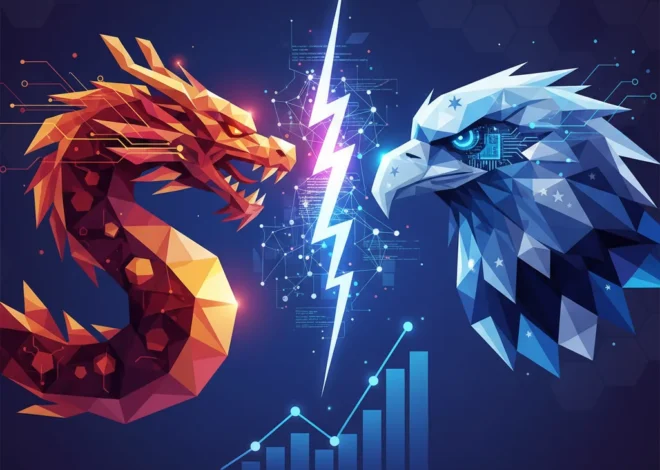
The Chip Deal Heard ‘Round the World: Why the US-Microsoft-UAE AI Pact is a Game Changer
In the 21st century’s great technological gold rush, the most valuable resource isn’t code, data, or even capital—it’s computational power. At the heart of this power are tiny, intricate pieces of silicon: AI chips. And in a move that sends ripples across the globe, the United States has just given Microsoft the green light to ship a massive trove of these coveted chips from Nvidia to the United-Arab Emirates (UAE).
This isn’t just another tech transaction. It’s a landmark decision by the U.S. Commerce Department that signals a profound shift in global technology alliances, cements the UAE’s ambitions as a major hub for artificial intelligence, and showcases a new form of high-stakes “tech diplomacy.” The approval, as reported by the Financial Times, paves the way for a monumental new investment in AI and cloud infrastructure in the Middle East, fundamentally altering the landscape for developers, entrepreneurs, and entire nations.
So, what does this deal really mean? Let’s break down the players, the technology, and the geopolitical chess match that’s unfolding before our eyes.
The Anatomy of a Landmark Deal
At its core, the agreement allows Microsoft to supply the UAE’s leading AI firm, G42, with a significant quantity of high-performance AI accelerators manufactured by Nvidia. While the exact models aren’t specified, we’re talking about the kind of hardware—like the sought-after H100 GPUs—that powers everything from large language models to complex scientific simulations. This is the bedrock of modern AI.
Why did this require the U.S. government’s blessing? For the past several years, Washington has been tightening its grip on advanced technology exports, particularly to China. The goal is to create a strategic chokepoint, preventing geopolitical rivals from using American-designed technology to gain a military or economic edge. Any deal involving the export of cutting-edge chips to a region with complex international relationships, like the Middle East, falls under intense scrutiny.
The approval for this deal is directly linked to a major strategic pivot by G42. The UAE-based AI champion, backed by its national security adviser Sheikh Tahnoon bin Zayed al-Nahyan, recently agreed to divest its Chinese investments and pivot towards U.S. technology. This move, which involved phasing out Chinese hardware (including from Huawei), was a critical prerequisite. In essence, G42 demonstrated its commitment to the U.S. tech ecosystem, and this chip deal is its reward—a powerful signal that allegiance has its benefits.
This decision is the culmination of a broader partnership, highlighted by Microsoft’s $1.5 billion investment in G42 earlier this year. That investment was more than just a financial vote of confidence; it was a strategic move to bind G42 to Microsoft’s Azure cloud platform and, by extension, to the U.S. technology sphere of influence.
The Billion-Dollar AI Hangover: Why Your New Tools Are Collecting Dust
The Geopolitical Chessboard: More Than Just Silicon
To view this as a simple commercial transaction is to miss the forest for the trees. This is a masterclass in 21st-century geopolitics, where technology, national security, and economic interests are inextricably linked. The stakes are incredibly high for every party involved.
Below is a breakdown of the key players and their strategic motivations in this complex arrangement:
| Player | Primary Goal / Interest | Potential Win | Potential Risk |
|---|---|---|---|
| United States | Counter China’s influence, strengthen alliances, and promote US tech leadership. | Pulls a key Middle Eastern partner firmly into its tech orbit, setting a precedent for other nations. | Advanced chips could be mishandled or indirectly benefit adversaries if cybersecurity measures fail. |
| United Arab Emirates (UAE) / G42 | Become a global leader in artificial intelligence and diversify its economy away from oil. | Gains access to world-class AI infrastructure, attracting talent and fostering domestic innovation. | Increased dependence on US technology and geopolitical alignment, potentially straining relations with other partners like China. |
| Microsoft | Dominate the global cloud computing market and entrench Azure as the platform for sovereign AI. | Secures a massive, long-term cloud customer and becomes the central technology partner for an entire nation’s AI ambitions. | Navigating complex export controls and the political sensitivities of operating critical infrastructure in a volatile region. |
| Nvidia | Sell its high-demand AI chips and expand into new, high-growth markets. | Opens up a significant new revenue stream and solidifies its market dominance in AI hardware. | Subject to the whims of US foreign policy and export regulations, which can change rapidly. |
This deal effectively draws a line in the sand. The U.S. is demonstrating that access to its premier technology is not a given; it’s a privilege reserved for trusted allies who align with its strategic interests. For the UAE, it’s a calculated decision to bet its technological future on the West, securing the tools it needs to achieve its ambitious national vision.
Microsoft’s Masterstroke: Building an AI Kingdom in the Desert
For Microsoft, this is far more than just a hardware sale facilitated for a partner. It’s a strategic masterstroke to secure the future of its Azure cloud empire. By ensuring G42’s massive AI infrastructure is built on Nvidia chips running within the Azure ecosystem, Microsoft achieves several key objectives:
- Creates a Moat: Once a nation’s sovereign AI models and critical government services are built on a specific cloud platform, the cost and complexity of switching become astronomically high. This deal entrenches Azure in the Middle East for a generation.
- Drives Ecosystem Growth: This new infrastructure will act as a magnet. Startups, enterprises, and developers across the region will flock to build their own software and SaaS products on top of this world-class platform. This creates a vibrant ecosystem that feeds back into Azure’s growth.
- Establishes a Blueprint for “Sovereign AI”: Nations around the world are grappling with how to leverage AI without sacrificing control over their data. Microsoft is positioning itself as the trusted partner for building these “sovereign AI” solutions, offering a package of hardware, software, and expertise. The UAE is now their flagship case study. This is a massive bet on the future of national cloud infrastructure.
This move is a direct challenge to competitors like Amazon Web Services and Google Cloud, signaling that the battle for cloud dominance is now being fought on the geopolitical stage as much as it is on technical performance or price.
AI's Dot-Com Déjà Vu: Why This Tech Boom is Faster, Fiercer, and Fundamentally Different
The Ripple Effect: What This Means for You
A deal of this magnitude isn’t confined to boardrooms and government offices. It will have a direct and tangible impact on the tech community, both in the Middle East and globally.
For Developers and Tech Professionals:
The UAE is about to become one of the hottest job markets for tech talent on the planet. The demand for skilled professionals in AI, machine learning, data science, cloud architecture, and, crucially, cybersecurity will explode. If you have expertise in programming for AI applications or managing large-scale cloud deployments, this region is now a prime destination for career growth. The establishment of this infrastructure will require a massive workforce to build, maintain, and innovate on top of it.
For Entrepreneurs and Startups:
This is a massive accelerant for innovation. The high cost of compute has long been a barrier for AI-focused startups. With G42 and Microsoft Azure providing state-of-the-art infrastructure, entrepreneurs will have access to the horsepower needed to develop and scale cutting-edge AI solutions. We can expect to see a surge in startups focused on everything from AI-driven healthcare and finance to logistics and smart city automation. The UAE is rolling out the red carpet for tech pioneers, and this deal provides the engine for their ambitions.
Code on the Asphalt: How AI and Software Are Redefining Hollywood's Most Dangerous Car Stunts
For the Global Tech Landscape:
The concentration of AI development power has, until now, been largely centered in North America and East Asia. This deal helps establish a powerful new hub in the Middle East. This decentralization is healthy for the global ecosystem, fostering diverse approaches to AI development and potentially leading to breakthroughs tailored to regional challenges. It also raises the stakes in the global race for AI supremacy, proving that significant capital and strategic partnerships can create a world-class AI hub from the ground up.
A New Chapter in the AI Revolution
The U.S. approval of this landmark chip deal is far more than a rubber stamp on a commercial sale. It is a defining moment in the story of artificial intelligence—a story where technology policy is now foreign policy, and where access to silicon is a symbol of strategic trust.
It represents a victory for Microsoft’s global cloud strategy, a monumental step forward in the UAE’s economic vision, and a clear message from the United States about the rules of engagement in a new era of technological competition. For everyone from the individual programmer to the aspiring startup founder, this deal opens up a new frontier of opportunity, powered by the most advanced technology humanity has ever created. The race is on, and the starting pistol was just fired in the deserts of the UAE.


